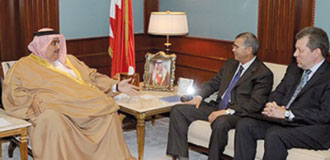
|
 |
 |
|
|
|
|
|
|
|
|
|
|
|
|
|
|
|
|
|
|
|
|
|
|
Exploratory Mission by the OHCHR in BahrainBetween the 1st and 6th of December 2012, an OHCHC delegation visited Bahrain by invitation from the Bahraini Government. According to the OHCHR, the visit was aimed at ‘exploring avenues for OHCHR’s engagement with Bahrain with regard to the protection and promotion of human rights’. During its visit, the delegation was received by the highest authorities of the Government, including the Prime Minister and the Ministers of Foreign Affairs, Human Rights, Interior, Justice, Information, Labour, Education and Health. It met representatives of other institutions, including the chief of the National Police, the head of the National Security Agency and its newly established ombudsman, as well as members of Parliament and of Shura Council of Representatives. The visit reflected an improvement in the relationship between the OHCHR and the Bahraini Government which was tense and lacked trust during the past period. Hopefully, the Bahraini Government will exert more efforts in order to develop human rights, provide answers to the international human rights organizations’ questions, gain the trust of the international community and work with OHCHR seriously and transparently.
Discussions also were held with the High Coordination Committee for Human Rights, chaired by the Minister for Human Rights, the National human rights institutions, the United Nations Country Team, and representatives of the diplomatic corps. According to its statement, the delegation also met human rights and other civil society activists, representatives of political parties, the private sector, workers unions, as well as families of detainees and other victims of human rights violations, including some of the 31 persons who had their nationality revoked. Moreover, it visited the Jaw prison and met the 13 prisoners whom it had visited in December 2011, as well as several other prisoners it had sought to meet. It also visited the Hoora detent?on centre. The delegation hoped that this visit would be an opportunity to explore with the Government and other Bahraini interlocutors, including civil society organisations, the potential for developing cooperation that would lead to tangible results for the people of Bahrain. The delegation was also briefed about the reforms undertaken to strengthen legal and national institutions critical to the promotion and protection of human rights in Bahrain, and in particular the steps thus far taken to implement the recommendations of the Bahrain Independent Commission of Inquiry (BICI) and the Universal Periodic Review (UPR). The delegation also stated that it received multiple requests for capacity building activities from a wide range of interlocutors. It discussed the High Commissioner’s concerns, as outlined in her statement of 22 November, relating to the need for an effective accountability process for the human rights violations of the past and the importance of civil society participation in any effort aimed at furthering the protection and promotion of human rights in the Kingdom. The delegation also noted in its statement that the Foreign Minister highlighted the importance of cooperating with the High Commissioner’s office. He also confirmed the Government›s consideration to ratify the Optional Protocol to the Convention against Torture (OP-CAT), and its invitation to the Special Rapporteur on Torture in February. He extended an official invitation to the High Commissioner for Human Rights to visit the country at a mutually convenient date. The statement concluded by stating that the mission will report its findings and observations to the High Commissioner Navanethem Pillay who will consider the level, scope and terms of the cooperation that the OHCHR will propose for discussion to the Government of Bahrain. With regards to the desired cooperation of the Government and civil society organizations with OHCHR, the latter has a lot of expertise and abilities in many fields and is very active in many countries. Bahraini official and civil bodies should determine their priorities and present them to the OHCHR which should include the following: 1/ providing support to human rights and civil societies in the field of training, rehabilitation, documentations and monitoring. This is in order to strengthen their abilities to produce professional work in the future. 2/ Enhancing the capabilities of the National Institution for Human Rights by providing it with ideas, expertise and training so that it can perform its required role in accordance with the Paris Principles. This will gives it international and local credibility and improve its performance in developing human rights in the country. 3/ A number of Government security and judicial apparatus need the expertise and technical supports of the OHCHR in order to further improve their abilities, understand how to confront problems and adhere to international standards with regards to protecting and promoting human rights. |
